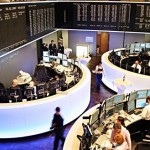The British pound jumped to the highest level in more than four years against the US dollar as bets for stronger economic growth and a wave of M&As fueled demand for the sterling.
GBP/USD hit a session high at 1.6857 at 12:45 GMT, after which consolidation followed at 1.6832, adding 0.19% for the day. Support was likely to be received at April 24th low, 1.6766, while resistance was to be encountered at November 17th 2009 high, 1.6873.
Demand for the sterling was supported by expectations that data tomorrow may show Gross Domestic Product rose at the fastest pace in four years in the three months ended March 31st. At the same time, house prices jumped for a 15th consecutive month in April, while growth expectations were at the highest in more than a decade. The US pharmaceutical giant Pfizer Inc. announced that it is interested in acquiring the assets of AstraZeneca Plc, UK second-largest drugmaker.
“GDP figures are out tomorrow and with good news people have decided to test recent highs” for the sterling, said Stuart Bennett, head of Group-of-10 foreign-exchange strategy at Banco Santander SA in London, cited by Bloomberg. “The market is still quite long sterling, it’s a crowded trade at the moment and it’s going to take a lot to jump higher.”
UK Gross Domestic Product probably increased by 0.9% in the quarter ended March 31st, up from 0.7% in the last quarter of 2013, according to the median estimate of analysts, before the data is published tomorrow. It would be the strongest performance since the second quarter of 2010.
Meanwhile, greenbacks demand was heightened by better-than-expected US pending home sales.
Pending home sales in the United States rose by 3.4% in March compared to February, sharply exceeding analysts expectations for a 0.9% gain and following an unexpected 0.8% drop in February. This indicator shows activity in terms of signing contracts for purchases of existing single-family houses. Actual payments are made one to two months after the contract has been signed. The index was started in 2001 and its base value was set at 100 points. The index of pending sales is built on broad national sample covering about 20% of the transactions of existing home sales.





